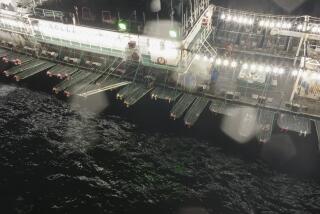Navy Studies Judicial Actions in Boat People Case
- Share via
SAN DIEGO — The Navy on Tuesday began reviewing a range of possible judicial actions against the captain of a U.S. warship that failed to rescue a boatload of Vietnamese refugees, who claim they later resorted to cannibalism to survive.
The Navy action was prompted by the refusal of Capt. Alexander G. Balian to participate in an administrative hearing on charges that he did not follow orders and Navy regulations when he left the refugees behind in the South China Sea, said Cmdr. Matt Dillon, a spokesman for the Pacific Fleet’s surface force.
Balian, 48, of Los Angeles was relieved of his duties as skipper of the Dubuque, an amphibious landing ship, after the Vietnamese survivors reached the Philippines last month and several told reporters that three of the refugees were murdered and their flesh was eaten. The reported cannibalism occurred after the Dubuque spotted the boat, gave the refugees food and left them at sea.
Dillon said Navy officials in San Diego were informed Tuesday afternoon that Balian had decided to forgo an administrative hearing set for today. The closed hearing, called an admiral’s mast, was to be before Vice Adm. George W. Davis Jr., head of the Pacific Fleet’s surface force.
Davis would have served as the lone judge and could have taken a variety of sanctions against Balian, including reprimand, censure and partial forfeiture of pay, Dillon said.
Officers have a right to turn down the hearing, Dillon said.
However, Balian’s decision to reject the hearing triggered a further review by Naval authorities. Dillon said one option is an investigation that could lead to a formal court martial, which is tantamount to a criminal trial and could result in far more serious penalties, including imprisonment.
Attempts to reach Balian for comment Tuesday were unsuccessful.
The Dubuque, which was based in San Diego several years ago, is now based in Japan and is at sea in the Persian Gulf.
The Dubuque encountered the refugee boat, containing more than 100 passengers, in the South China Sea on June 9. Navy policy is to give humanitarian assistance whenever possible, but it is left up to a ship’s commanding officer to judge whether a refugee boat is in danger of sinking and if the people aboard need to be picked up.
Navy officials have said Balian gave the refugees several hundred pounds of supplies, including food and water, but refused to take them aboard the Dubuque because he judged their boat to be seaworthy.
Only 52 of the about 110 people aboard survived the trip from Ben Tre in southern Vietnam, which ended June 28 when the group was finally rescued by Philippine fishermen after 37 days at sea.
Robert Cooper, Manila representative of a United Nations commission investigating the incident, told the Associated Press that the refugees began their journey May 22 from the Mekong Delta town of Ben Tre aboard a 35-foot wooden boat. Its engine failed two or three days later.
Some of the survivors have been quoted in Phillipine press reports as saying they killed and ate some of their fellow passengers to stay alive after they encountered the Dubuque. Some of the refugees reported that they had drowned three of those aboard and boiled and ate their flesh.
More to Read
Sign up for Essential California
The most important California stories and recommendations in your inbox every morning.
You may occasionally receive promotional content from the Los Angeles Times.













